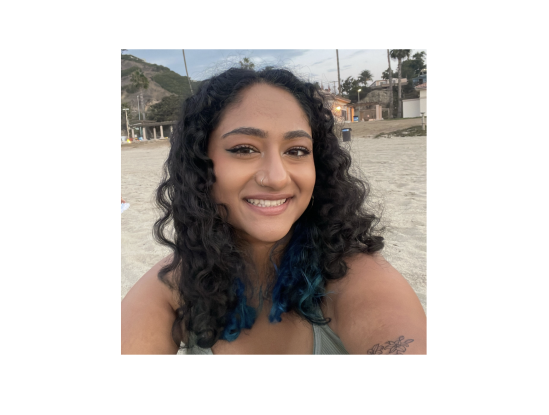Student Spotlight – Abeeha Hussain
Meet UCLA undergraduate researcher Abeeha Hussain!
Abeeha Hussain majors in Political Science and Labor Studies, and participates in our Undergraduate Research Scholars Program! The title of her project is “Measuring Impacts of Immigration on Levels of Observed Linked-Fate: Immigrant Communities Los Angeles After 2016 (ILOL: Los Angeles).” Her work explores how critical race theory applications of Linked Fate and Group Consciousness can be reflected in a non-racial identity like being an immigrant. Her best advice is if you notice a particular subject constantly excites you to find out more, speak to someone at URC, your professors, TAs, or peers because someone is bound to be curious about the same topic!
How did you first get interested in your research project?
Going back home to Pakistan used to be my favorite time of the year. I would anxiously wait the entire 26 hours of flights and travel to get hit with the warm (120-degree) smell of cigarettes and gasoline upon my exit from the airport. For a good amount of time, I couldn’t understand why my parents would ever want to leave the food, the culture, and the family of home for the United States, where they didn’t have the support system I could tell energized them to be proud Pakistanis. As I moved back and forth between the two disparate countries, I began my journey toward the appreciation of the immigrant experience. It struck oddly to me that I was learning about the American Dream and the wide variety of opportunities up for grabs in the U.S. but politics had convinced me that being non-American (as defined by citizenship status) ultimately meant your experience was going to be underscored with the idea that you simply aren’t from here. My parents and their friends always joked about how they lived in America longer than their kids (myself included), but would never be truly American like them. I wanted to know how this outlook on immigration in society affected immigrant communities both large and small, together and separate, historic and recent. This is how I became interested in my current research topics, looking into how critical race theory applications of Linked Fate and Group Consciousness can be reflected in a non-racial identity like being an immigrant. Immigration has been significantly racialized since the turn of the century, and as we begin to become increasingly conscious of identity-based impacts, I want my research to prove how our systems deliberately and disproportionately impact those who are most vulnerable in American society and culture.
What probably excites me the most is that I feel like I’m serving a community that has really gifted me the ability to live with the benefits of their hard work and sacrifices. Like many of my peers, my parents made the move to the States with the understanding that they wouldn’t be able to go to k-12 or university in America the way I could, having English be my first language or the tons of other privileges of being born in America. I feel like my research can one day bring justice back to them, proving their disparate treatment based on their identity as momentum for change and deviating away from the xenophobia raging in public opinion.
What has surprised you about your research or the research process?
What is one piece of advice you have for other UCLA students thinking about doing research?
A lot of us have heard the “if you have a question, there are probably a dozen others who have the same one” but it is so true. Research and its public access is the source of the answers to the questions we have about the world we live in. If you are curious about something, or you notice a certain subject just constantly gets you excited to find out more, speak to someone at URC! Talk to your professors, TAs, peers, or anyone, someone is bound to be curious about the same topic. You are in the birthplace of such groundbreaking and life-changing knowledge that it cannot hurt to at least try to find the answer at UCLA while you have access to resources like your department, URC, the UC Library, etc!
I poked at this earlier, but I want my research to bring eventual justice to the immigrant community in America. The millions of folks who are active members of communities and society deserve to not have their immigrant status used against them in labor practices, policies, or just everyday living. They should not feel burdened because of the media and political portrayals of immigrants. They should be able to thrive and cultivate their culture even when away from home, not fear their deportation, or take the hit for world events out of their hands. If I can help prove the existence of group consciousness and linked fate in immigrant communities in Los Angeles, it can be used to influence corrective civil rights legislation to increase protections for immigrants from these fears.




